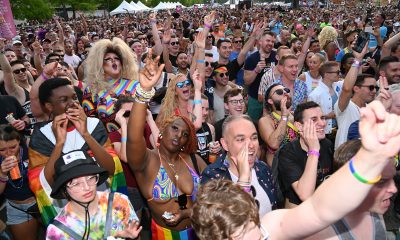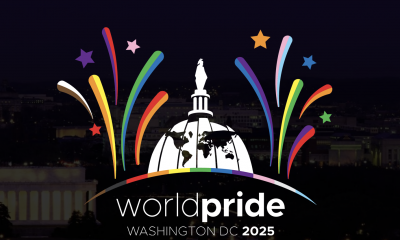National
Musk’s Twitter takeover riles some LGBTQ users
Concerns about hate speech under new ownership

The purchase of Twitter by Elon Musk is garnering headlines over the unprecedented nature of the entrepreneur acquiring an influential social media platform, but also causing anxiety among many LGBTQ users who fear the new owner’s stated commitment to free speech will leave them vulnerable to hateful discourse online.
Much of the concern is from progressives worried about Musk, who as the world’s richest person has made political contributions to both Democrats and Republicans. Some have threatened to bolt the platform in protest — and a few have made good on that promise.
Sarah Kate Ellis, CEO of the LGBTQ media watchdog GLAAD, said in a statement Monday upon the purchase her organization will be watching to see whether Twitter will maintain its commitment to combating hate speech on the platform.
“Twitter should hold to its principles and the industry standard of prohibiting speech that endangers people, spreads misinformation and incites harassment and abuse,” Ellis said. “LGBTQ people are at disproportionate risk for harassment online and violence in real life. The cost of hate speech further erodes basic safety and civility across society. Elon Musk and his investors should prioritize content moderation to create spaces where truth is elevated over harmful and inaccurate opinions and where public figures are held accountable.”
One statement from Musk that has prompted concerns among users was a tweet he issued last year criticizing the concept of identifying one’s personal pronouns on messaging or personal bios. Musk wrote: “I absolutely support trans, but all these pronouns are an esthetic nightmare.” The comment drew consternation from critics who said the complaint was an assault on LGBTQ-inclusivity.
Despite the offending line, Musk doesn’t have a history of aligning himself with anti-LGBTQ causes. Additionally, Tesla, the car company owned by Musk, has won a perfect “100” score from the Human Rights Campaign’s Equality Index, which includes requirements for an LGBTQ-inclusive workplace.
One example of a recent incident on Twitter over the divide between free speech and hate speech was a post by the satirical website Babylon Bee mocking Assistant Secretary for Health Rachel Levine, the first transgender presidential appointee to obtain Senate confirmation, as “Man of the Year.” Babylon Bee was suspended in March for the tweet amid consternation from conservatives who said their discourse was impaired.
Under new ownership pledging a greater commitment to free speech on Twitter, questions remain about how a similar incident would play out. (That said, Twitter has always been a place where vitriol often runs freely, so a greater commitment to free speech may not change much on that front.)
Progressives who bolted Twitter in response to the purchase include Shaun King, a Black Lives Matter activist who appears to have quit the platform, and Erik Larsen, a comic book artist for “The Amazing Spider-Man.” Other progressives, including political consultant Neera Tanden, have complained they’ve lost followers upon the announcement of the sale.
The anxieties among LGBTQ people over Musk’s purchase, however, may be overstated. After all, Musk has built a reputation as a colorful and visionary entrepreneur who has even made an appearance on “Saturday Night Live” as guest host. A look at the social media accounts of many gay men reveals appreciation and reverence for Musk over his deal to acquire Twitter.
Charlotte Clymer, a transgender progressive activist, wrote in her Substack newsletter on Monday she has no intention of leaving Twitter, despite having concerns about Musk and skepticism of his view of free speech.
“Even if Musk’s goal would be an inclusive website for all communities — and let’s be clear, that doesn’t seem to be the case — his primary objective (so-called “free speech”) will almost certainly lead to a proliferation of harassment, doxxing, death threats, etc. against marginalized people on Twitter,” Clymer said.
Musk, in response to criticisms over his purchase of Twitter, posted a statement to his own account on Monday outlining his stated goal in moving the platform toward his vision for enabling free speech online.
“Free speech is the bedrock of a functioning democracy, and Twitter is the digital town square where matters vital to the future of humanity are debated,” Musk said in a statement announcing the deal. “I also want to make Twitter better than ever by enhancing the product with new features, making the algorithms open source to increase trust, defeating the spam bots and authenticating all humans.”
Twitter didn’t respond to the Washington Blade’s request to comment via email to concerns and questions about how Musk’s direction for the company will affect LGBTQ users, whether it will maintain a policy of no hate speech and whether the new ownership will refuse to censor LGBTQ content in countries with prohibitions on free speech, including in China and Russia.
U.S. Supreme Court
Supreme Court to consider bans on trans athletes in school sports
27 states have passed laws limiting participation in athletics programs

The U.S. Supreme Court on Thursday agreed to hear two cases involving transgender youth challenging bans prohibiting them from participating in school sports.
In Little v. Hecox, plaintiffs represented by the ACLU, Legal Voice, and the law firm Cooley are challenging Idaho’s 2020 ban, which requires sex testing to adjudicate questions of an athlete’s eligibility.
The 9th U.S. Circuit Court of Appeals described the process in a 2023 decision halting the policy’s enforcement pending an outcome in the litigation. The “sex dispute verification process, whereby any individual can ‘dispute’ the sex of any female student athlete in the state of Idaho,” the court wrote, would “require her to undergo intrusive medical procedures to verify her sex, including gynecological exams.”
In West Virginia v. B.P.J., Lambda Legal, the ACLU, the ACLU of West Virginia, and Cooley are representing a trans middle school student challenging the Mountain State’s 2021 ban on trans athletes.
The plaintiff was participating in cross country when the law was passed, taking puberty blockers that would have significantly reduced the chances that she could have a physiological advantage over cisgender peers.
“Like any other educational program, school athletic programs should be accessible for everyone regardless of their sex or transgender status,” said Joshua Block, senior counsel for the ACLU’s LGBTQ and HIV Project. “Trans kids play sports for the same reasons their peers do — to learn perseverance, dedication, teamwork, and to simply have fun with their friends,” Block said.
He added, “Categorically excluding kids from school sports just because they are transgender will only make our schools less safe and more hurtful places for all youth. We believe the lower courts were right to block these discriminatory laws, and we will continue to defend the freedom of all kids to play.”
“Our client just wants to play sports with her friends and peers,” said Lambda Legal Senior Counsel Tara Borelli. “Everyone understands the value of participating in team athletics, for fitness, leadership, socialization, and myriad other benefits.”
Borelli continued, “The U.S. Court of Appeals for the Fourth Circuit last April issued a thoughtful and thorough ruling allowing B.P.J. to continue participating in track events. That well-reasoned decision should stand the test of time, and we stand ready to defend it.”
Shortly after taking control of both legislative chambers, Republican members of Congress tried — unsuccessfully — to pass a national ban like those now enforced in 27 states since 2020.
Federal Government
UPenn erases Lia Thomas’s records as part of settlement with White House
University agreed to ban trans women from women’s sports teams

In a settlement with the Trump-Vance administration announced on Tuesday, the University of Pennsylvania will ban transgender athletes from competing and erase swimming records set by transgender former student Lia Thomas.
The U.S. Department of Education’s Office for Civil Rights found the university in violation of Title IX, the federal rights law barring sex based discrimination in educational institutions, by “permitting males to compete in women’s intercollegiate athletics and to occupy women-only intimate facilities.”
The statement issued by University of Pennsylvania President J. Larry Jameson highlighted how the law’s interpretation was changed substantially under President Donald Trump’s second term.
“The Department of Education OCR investigated the participation of one transgender athlete on the women’s swimming team three years ago, during the 2021-2022 swim season,” he wrote. “At that time, Penn was in compliance with NCAA eligibility rules and Title IX as then interpreted.”
Jameson continued, “Penn has always followed — and continues to follow — Title IX and the applicable policy of the NCAA regarding transgender athletes. NCAA eligibility rules changed in February 2025 with Executive Orders 14168 and 14201 and Penn will continue to adhere to these new rules.”
Writing that “we acknowledge that some student-athletes were disadvantaged by these rules” in place while Thomas was allowed to compete, the university president added, “We recognize this and will apologize to those who experienced a competitive disadvantage or experienced anxiety because of the policies in effect at the time.”
“Today’s resolution agreement with UPenn is yet another example of the Trump effect in action,” Education Secretary Linda McMahon said in a statement. “Thanks to the leadership of President Trump, UPenn has agreed both to apologize for its past Title IX violations and to ensure that women’s sports are protected at the university for future generations of female athletes.”
Under former President Joe Biden, the department’s Office of Civil Rights sought to protect against anti-LGBTQ discrimination in education, bringing investigations and enforcement actions in cases where school officials might, for example, require trans students to use restrooms and facilities consistent with their birth sex or fail to respond to peer harassment over their gender identity.
Much of the legal reasoning behind the Biden-Harris administration’s positions extended from the 2020 U.S. Supreme Court case Bostock v. Clayton County, which found that sex-based discrimination includes that which is based on sexual orientation or gender identity under Title VII rules covering employment practices.
The Trump-Vance administration last week put the state of California on notice that its trans athlete policies were, or once were, in violation of Title IX, which comes amid the ongoing battle with Maine over the same issue.
New York
Two teens shot steps from Stonewall Inn after NYC Pride parade
One of the victims remains in critical condition

On Sunday night, following the annual NYC Pride March, two girls were shot in Sheridan Square, feet away from the historic Stonewall Inn.
According to an NYPD report, the two girls, aged 16 and 17, were shot around 10:15 p.m. as Pride festivities began to wind down. The 16-year-old was struck in the head and, according to police sources, is said to be in critical condition, while the 17-year-old was said to be in stable condition.
The Washington Blade confirmed with the NYPD the details from the police reports and learned no arrests had been made as of noon Monday.
The shooting took place in the Greenwich Village neighborhood of Manhattan, mere feet away from the most famous gay bar in the city — if not the world — the Stonewall Inn. Earlier that day, hundreds of thousands of people marched down Christopher Street to celebrate 55 years of LGBTQ people standing up for their rights.
In June 1969, after police raided the Stonewall Inn, members of the LGBTQ community pushed back, sparking what became known as the Stonewall riots. Over the course of two days, LGBTQ New Yorkers protested the discriminatory policing of queer spaces across the city and mobilized to speak out — and throw bottles if need be — at officers attempting to suppress their existence.
The following year, LGBTQ people returned to the Stonewall Inn and marched through the same streets where queer New Yorkers had been arrested, marking the first “Gay Pride March” in history and declaring that LGBTQ people were not going anywhere.
New York State Assemblywoman Deborah Glick, whose district includes Greenwich Village, took to social media to comment on the shooting.
“After decades of peaceful Pride celebrations — this year gun fire and two people shot near the Stonewall Inn is a reminder that gun violence is everywhere,” the lesbian lawmaker said on X. “Guns are a problem despite the NRA BS.”
-

 U.S. Supreme Court3 days ago
U.S. Supreme Court3 days agoSupreme Court to consider bans on trans athletes in school sports
-

 Out & About3 days ago
Out & About3 days agoCelebrate the Fourth of July the gay way!
-

 Virginia3 days ago
Virginia3 days agoVa. court allows conversion therapy despite law banning it
-

 Maryland5 days ago
Maryland5 days agoLGBTQ suicide prevention hotline option is going away. Here’s where else to go in Md.












